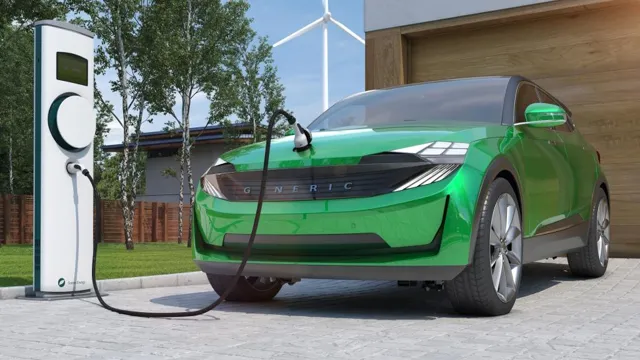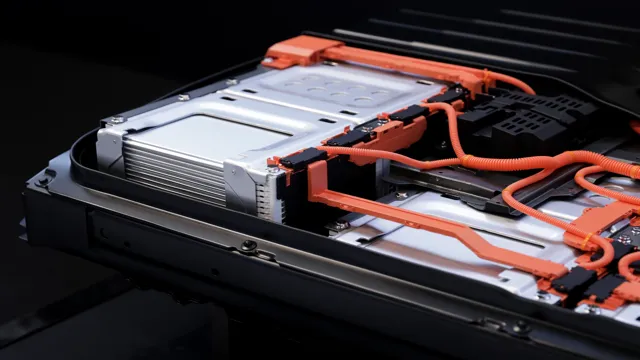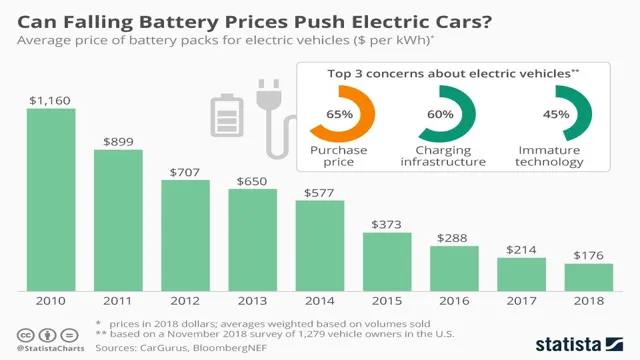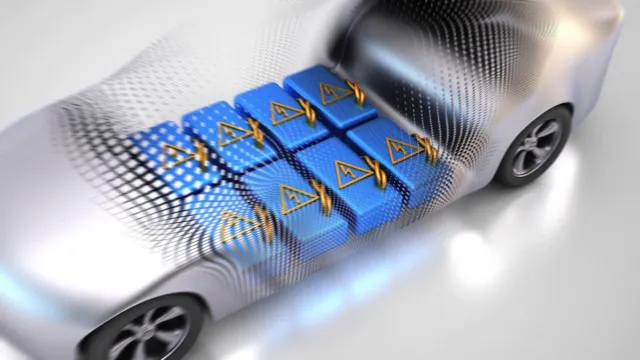Electric Cars: Revealing the Truth Behind Lithium Battery Power
Electric cars are taking the world by storm. With climate change and the effects of fossil fuels becoming more pressing concerns, it’s no wonder that more and more people are turning to eco-friendly modes of transportation. One thing that many people might not know, however, is what exactly powers these electric cars.
We’ve all heard of lithium batteries, but do electric cars really run on them? Well, the short answer is yes- but it’s a bit more complicated than that. In this blog post, we’ll break down the nitty-gritty details of how lithium batteries work and why they’re such an important component of electric cars.
Explaining the Basics of Electric Vehicles
Electric cars do run on lithium batteries, as they are the most commonly used type of battery in electric vehicles. Lithium-ion batteries offer a high energy density, meaning they can store a lot of energy in a relatively small package, making them ideal for EVs. Lithium batteries contain a positive electrode, a negative electrode, and an electrolyte solution that acts as a medium for ion exchange.
When the car is in use, the battery provides power to the motor, allowing it to turn the wheels of the vehicle. While there are other types of batteries that can be used in electric cars, such as nickel-metal hydride, lithium batteries have become the industry standard due to their superior performance and durability. So when you’re driving an electric car, you’re actually using the power stored in a lithium-ion battery to get from point A to point B!
The Power Source of Electric Vehicles
The power source of electric vehicles is essential to their functionality. EVs are powered by an electric motor, which is fueled by a battery pack. These battery packs are made up of lithium-ion cells and are charged through an external power source, such as a charging station or wall socket.
Just like with a smartphone or laptop, these battery packs eventually lose their charge over time. However, unlike these devices, many EVs have regenerative braking systems that allow the battery to recharge with energy generated during braking or coasting. EVs are not only efficient in terms of energy consumption but also environmentally friendly with zero emissions.
Charging time and range are some of the factors that consumers should consider when buying an EV. Therefore, it is important to do research and calculate personal needs to find the right model that fits driving demands.
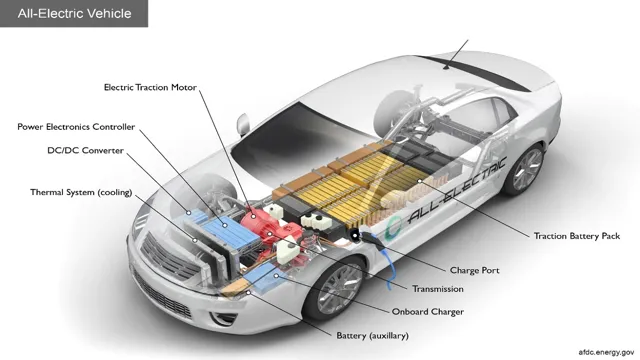
Why Lithium Batteries Are Used in Electric Cars
Lithium batteries have become the go-to choice for electric car manufacturers for several reasons. Electric cars rely on rechargeable batteries to store and supply power to the motor, and lithium batteries have proven to be the most efficient solution. Lithium batteries are lightweight, durable, and have a high energy density, meaning they can store more energy in a smaller size than other battery types.
This makes them perfect for electric cars, which require a lot of power storage in a compact space. Lithium batteries are also more environmentally friendly as they have a longer lifespan and are easier to recycle than other battery types. In addition, they can be recharged quickly and efficiently, reducing the need for frequent battery replacement.
Overall, the use of lithium batteries in electric cars is a win-win solution for both the manufacturers and the consumers, providing durability, efficiency, and environmental benefits.
The Role of Lithium Batteries in Electric Cars
Yes, electric cars do run on lithium batteries. Lithium-ion batteries are the most common type of battery used in electric vehicles due to their high energy density and long life span. They are made up of a cathode, an anode, and an electrolyte, with the cathode made up of lithium-ion.
When the battery is charged, lithium-ions move from the cathode to the anode, generating electric power that drives the motor. These batteries can hold a lot of energy in a small, lightweight package, making them ideal for powering electric cars. In recent years, there have been significant advancements in lithium battery technology, including the development of solid-state lithium batteries, which offer even greater energy density and safety.
As lithium battery technology continues to advance, it is likely that we will see even more electric cars on the road in the future.
How Lithium Batteries Power Electric Vehicles
Lithium batteries are crucial in powering electric vehicles and have become increasingly popular due to their high energy density and long lifespan. These batteries consist of a cathode, an anode, and an electrolyte, all of which work together to produce an electric current. The cathode is typically made of lithium cobalt oxide, while the anode is made of graphite.
When the battery is charged, lithium ions move from the cathode to the anode, where they are stored. When the battery discharges, the lithium ions move back to the cathode, producing an electric current. Lithium batteries have a higher energy density than other types of batteries, allowing electric cars to travel longer distances on a single charge.
They are also more environmentally friendly than traditional fossil-fuel powered cars, as they produce zero emissions. Overall, the widespread use of lithium batteries in electric cars represents a significant step towards a more sustainable future.
The Advantages of Lithium Batteries in Electric Cars
The role of lithium batteries in electric cars is a crucial aspect that cannot be overlooked. Lithium-ion batteries are the most common type of battery used in electric cars due to their high energy density, which allows for a longer driving range. This is a significant advantage for electric car owners as they can travel longer distances without having to worry about recharging their batteries frequently.
Additionally, lithium batteries have a longer lifespan and are more environmentally friendly than traditional lead-acid batteries. The overall efficiency of electric cars is also improved with lithum batteries as they require less maintenance and recharge faster. In summary, the advantages of using lithium batteries in electric cars are numerous and fundamental for the growth of the electric vehicle industry.
The Challenges of Using Lithium Batteries in Electric Vehicles
Electric vehicles (EVs) are seen as a solution to the pollution caused by traditional gasoline-powered automobiles. One key component of EVs is the lithium-ion battery, which allows for sustainable, emission-free travel. Lithium batteries are also lightweight and have a long lifespan compared to other battery types.
However, using lithium batteries in electric cars creates certain challenges that need to be addressed. One drawback is their cost, which is still high when compared to conventional batteries. Another challenge is the durability of lithium-ion batteries, which can decrease under extreme temperatures.
Nonetheless, these challenges are being tackled by scientists and engineers, who are working on improving lithium battery performance.
The Future of Lithium Batteries in Electric Cars
Yes, most electric cars run on lithium batteries which have become increasingly popular in recent years. These batteries offer many benefits like being lightweight and having high energy density, enabling electric cars to go further on a single charge. Additionally, lithium batteries have a longer lifespan and offer faster charging times compared to traditional lead-acid batteries.
However, there are still some challenges that need to be addressed to make these batteries even more efficient and cost-effective. For instance, lithium is a limited natural resource that needs to be extracted and refined, and the disposal of lithium batteries also presents environmental concerns. Nonetheless, with ongoing research and development, the future of lithium batteries in electric cars looks bright, as they will continue to play a key role in the transition towards a more sustainable and eco-friendly transportation system.
Developing More Efficient and Cost-Effective Battery Technology
As electric vehicles become more widespread, the importance of developing more efficient and cost-effective battery technology becomes even more critical. Lithium batteries have been the preferred choice for electric cars for many years, but improvements still need to be made to make them more suitable for long-distance travel. Scientists and researchers are looking at ways to increase their energy density, extend their lifespan, reduce their weight and size, and decrease the risk of fire.
One promising development in lithium battery technology is solid-state batteries, which do not use a liquid electrolyte and can potentially offer higher energy density and faster charging times. However, more research and development are needed to make them commercially viable on a large scale. Overall, the future of lithium batteries in electric cars looks bright, as improvements in their technology will continue to drive down costs and increase their performance, making electric vehicles a more practical and accessible choice for drivers.
The Potential for Lithium-Ion Batteries in Next-Generation Electric Cars
Lithium-ion batteries are becoming increasingly popular in electric cars due to their high energy density, which allows for longer driving ranges and faster charging times. As the demand for electric cars continues to grow, the potential for lithium-ion batteries to become a standard feature in these vehicles is becoming more apparent. However, there are still some challenges that need to be addressed before this can happen.
For instance, while lithium-ion batteries are more efficient than traditional lead-acid batteries, they can still be quite expensive and may not be accessible to everyone. Additionally, there are concerns around the safety of these batteries in terms of overheating and potential fires. Overall, while there is still some work to be done, the potential for lithium-ion batteries to revolutionize the electric car industry is certainly exciting.
Conclusion: Lithium Batteries Are Key to Electric Vehicle Performance
In conclusion, while electric cars do not directly run on lithium batteries, these batteries play a crucial role in powering the vehicle. They are the heart of the electric car’s powertrain and provide an efficient and sustainable source of energy. So, while electric cars don’t quite run on these batteries, they certainly wouldn’t be going anywhere without them!”
FAQs
What type of batteries do electric cars use?
Most electric cars use lithium-ion batteries.
How long do lithium batteries last in electric cars?
The lifespan of lithium batteries in electric cars varies, but they can last anywhere from 5 to 15 years depending on usage and maintenance.
Can lithium batteries be recycled from electric cars?
Yes, lithium batteries from electric cars can be recycled. In fact, recycling these batteries reduces the environmental impact of the electric car industry.
Are there any safety concerns with lithium batteries in electric cars?
While lithium-ion batteries in electric cars have undergone significant safety testing, they still have the potential to overheat or catch fire if damaged or improperly stored. Manufacturers have implemented safety features to minimize these risks, but it’s important for individuals to follow proper charging and storage procedures.
